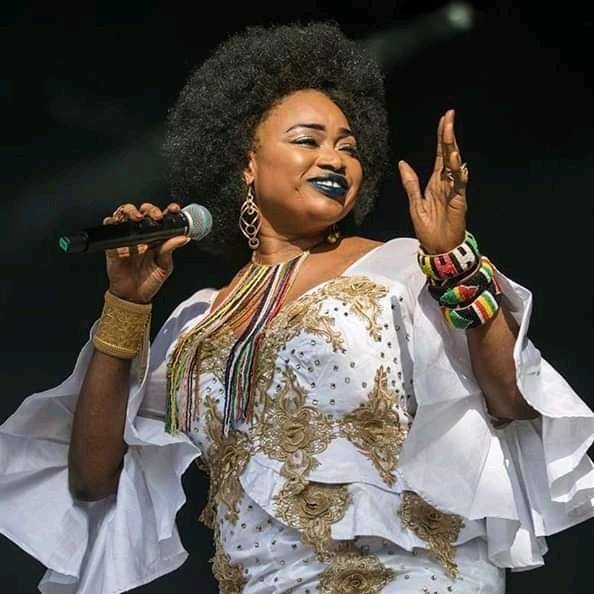By: Jeanne Lacaille
When it comes to African classics, Oumou Sangaré’s debut album Moussolou, stands far out from the rest. She presents herself on the album as the same rebellious and troublemaking diva we know today, singing about the plight of women.
“I didn’t even want to record an album at the time,” said Oumou Sangaré about Moussolou, her debut studio she recorded in 1989. Yet, thirty years and ten albums later, the singer shines on as a crucial voice for Mali, both as an African icon and an international star, as well as an accomplished businesswoman – she owns a hotel, a pioneering farm, a car company and a taxi company – and a freedom fighter, whose integrity, perseverance and outspokenness remains highly respected. A woman standing tall and a pivotal artist.
“The first time I heard Oumou, it was on a cassette tape version of Moussolou that Ali Farka Touré gave me,” recalls Nick Gold, head of the World Circuit label, in an interview he gave to the French newspaper Le Monde. “For months I have listened to it on loop. When I traveled through Mali, I would hear it everywhere. There was no way I could have escaped this music!” The truth is, Sangaré’s sounds caused a sensation and the cassette, initially released in 1990 by Syllart Records, sold over 250,000 copies, an absolute record-breaker for the time. “The day the album was released, people were lining up to buy it. And from there, it literally took off,” Oumou Sangaré recounts in the booklet included in Moussolou‘s 2016 reissue on World Circuit. But the secret behind its success however may be down to, of all things… a car!
When Oumou Sangaré opened the doors to the fundamental JBZ studios in Abidjan to record the six tracks of Moussolou, the young woman was far from naive: at 21, she had already toured Europe with the Djoliba Percussions ensemble alongside Toumani Diabaté, and had already secured full financial autonomy, earning her living by singing at weddings and baptisms in Bamako. “The producer Samassa had already invited me several times to record an album, but I always refused, because I thought if it didn’t work out I would feel ashamed. But he kept coming after me, and even ended up offering his own car to me as a gift and at that point I said to myself: ‘Oumou, you’re riding a Yamaha motorcycle. Now look, a car is a much better option!’ And I accepted the offer!” she explained. This anecdote may well make you smile, but it also reveals a strong personality trait.
In the studio, Oumou Sangaré stood up to producers who criticized her music for being too traditional sounding, and stayed firmly reluctant in accepting the use of the drum machine which they tried to impose on her. It is primarily through the lyrics in her songs however that Oumou Sangaré truly affirms her rebellious nature: challenging taboo’s against the weight of a conservative society, the singer stood by the side of African women (“Moussolou”), celebrated sensual loving (“Diaraby Nene”) as well as sincere loving (“Ah Ndiya”), and did not hesitate to oppose forced and arranged marriages (“Diya Gneba”). Unambiguously titled and containing openly feminist lyrics, Moussolou (“women”) of course, caused a scandal upon its release. “It really upset a lot of people, but I feel it was necessary,” reckons Sangaré. “It was majorly criticized by the press. It was a complete disaster. It was a revolutionary moment and, strangely, I enjoyed it at the same time. It was so empowering! You couldn’t ignore it. It was just huge.” It paved the way for a new generation of artists who dared to express themselves by following in her footsteps. Oumou Sangaré then without realizing it, became celebrated as a feminist icon, responding to the concerns of thousands of women whose plight she has never let go of since.
An amazon of Africa, Oumou Sangaré is also a true ambassador for the Wassoulou region, the lungs of southwestern Mali, whose economy she has supported by orchestrating in particular the ambitious FIWA, International Wassulu Festival, since 2017. The Wassoulou is also the region of her mother, “a fighter” to whom she paid homage to on Moussolou by choosing to sing in Wassoulou n’ke [the dialect of Wassoulou; author’s note] and by using the rhythms of the region, inherited, in part, by the hunters’ ancestral rituals.
In order to modernize the sounds of Wassoulou whilst respecting the traditions, Oumou Sangaré called on Amadou Ba Guindo – then a member of the prestigious Mali-based National Badema orchestra – whose minimalist arrangements undoubtedly contributed to the success of her first opus, a timeless masterpiece, revealing from early on, the huge hit-making potential the singer had. Bass and guitar unify the virtuously played kamalé ngoni (harp-lute) and karignan (a scrape-styled percussion instrument) whilst an unexpected violin adds unique nuances to the fold.
Flexible, powerful and untamable, Oumou Sangaré’s voice eventually transcends this landmark record in her discography – the starting point of a majestic career. This was made evident on her recent afro-house collaboration with the duo Synapson, and on her latest album, Mogoya (2017, No Format), whose music is enriched by synth-leads and psychedelic guitars that share the beat with rhythms performed by the late Tony Allen. Oumou Sangaré is a woman of her time who has remained loyal to her roots – to which she overtly pays homage to on Acoustic, an album recorded in two days without any of the usual accompanying safety nets, set to be released on June 19, 2020.





